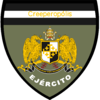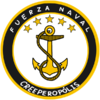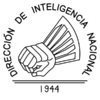National Intelligence Directorate
Dirección de Inteligencia Nacional | |
 | |
| Intelligence agency overview | |
|---|---|
| Formed | 26 April 1933 |
| Type |
|
| Jurisdiction | |
| Status | Active |
| Headquarters | San Salvador, San Salvador, Creeperopolis |
| Motto | "Authority, Security, Peace"[note 1] |
| Employees |
|
| Annual budget | Classified |
| Minister responsible | |
| Website | dina.gob.cr |
| Agency ID | DINA |
The National Intelligence Directorate (Creeperian – Creeperian: Դիրեծծիօն դե Ինտելիգենծիա Նածիոնալ; Creeperian – Iberic: Dirección de Inteligencia Nacional;[note 2] abbreviated: DINA or ԴԻՆԱ) is the intelligence agency and secret police of Creeperopolis and its vassal states of El Salvador and the State of the Church. The DINA is headed by Supreme Caudillo Augusto Cabañeras Gutiérrez, the Minister of Intelligence.
The DINA is an essential tool of the Creeperian government and Creeperian Armed Forces and is instrumental in the success of the Operation Genesis 19:24–25. It has been frequently accused of committing human rights abuses and crimes against humanity, and engaging in state and state-sponsored terrorism.
Contents
History
Civil war
The DINA was established on April 26, 1933, during the first year of the Creeperian Civil War. It was established on orders of Emperor Romero I as a way to arrest and interrogate captured Miguelist prisoners of war. Control of the secret police was given to Minister of Defense, Adolfo Cabañeras Moreno.
Adolfo Cabañeras Moreno authorized the use of any means deemed necessary to retrieve information from the prisoners being interrogated. The DINA became known across war-torn Creeperopolis as a ruthless organization that uses various means of torture to force their prisoners to speak. If a prisoner refused to speak after a month of various torture methods conducted by the DINA, they were often left to starve in their cell or executed by hanging. During the civil war, DINA members who were captured by the Miguelists were hanged without a trial.
Following the assassination of Adolfo Cabañeras Moreno, his successor, Alfonso Cabañeras Moreno, increased the torture period to two months and prohibiting hangings of prisoners stating:
"It is better to let an animal starve to death so it suffers until its last breath knowing it could have saved itself, than to give it mercy and end its misery."
Alfonso Cabañeras Moreno authorized the DINA to commit countless human rights abuses during the Creeperian Civil War. Throughout the civil war, the DINA is estimated to have tortured over 30,000 prisoners, hanged over 6,000, and left over 9,000 to starve to death.[citation needed]
The DINA is believed to have the most human rights abuses committed during the civil war, second only to the death squad known as Sombra Negra.
Alfonso Cabañeras Moreno also changed the date at the bottom of the DINA logo from 1933, the year of its establishment, to 1944, the year his brother and the DINA's first Chief was assassinated.
Post-civil war
| Operation Genesis 19:24–25 |
|---|
Following the civil war, Alfonso Cabañeras Moreno continued to use the secret police as a means to weed out the final remnants of communism, socialism, and leftism from Creeperopolis. The DINA also shifted its focus to carry out operations against the Senvarian Liberation Front in the Third Senvarian Insurgency.
The DINA was brought under heavy attack and criticism by Salvadoran activists and revolutionaries during the 1956 Salvadoran Revolution. President Paúl Sáenz Mina declared that DINA presence in revolutionary El Salvador was illegal and that all DINA agents would be executed immediately upon capture without a trial. The DINA retreated from El Salvador and allowed the Creeperian Army to crush the revolution. As part of a compromise to appease the Salvadorans, Emperor Romero II agreed to withdraw the DINA from El Salvador indefinitely.
When the Mara War broke out in 1979, Chief Emmanuel Cabañeras Videla ordered the DINA to be more cruel and more violent in its interrogation methods, especially to members of the gang Mara Salvatrucha. Cabañeras Videla told his agents to be more cruel than the DINA under Cabañeras Moreno during the civil war. Torture periods were raised to one year and prisoners were to be shackled in their cells permanently, only to be released for "interrogation."
During the October 16 Regime of Alfonso VI, DINA power and influence was curbed, angering Cabañeras Videla and the entire DINA. Cabañeras Videla died on October 19, 2002. His son, Augusto Cabañeras Gutiérrez, became the new Chief of the DINA with the approval of Alfonso VI.
Cabañeras Gutiérrez plotted with the Chief Admiral of the Creeperian Navy, José Guerrero López, and the Chief General of the Creeperian Air Force, Felipe Cambeiro Cavallería, to topple Alfonso VI's regime and establish a military junta over Creeperopolis, essentially abolishing the monarchy. Cabañeras Gutiérrez, however, saw the Emperor's son, Alexander Martínez Hernández, as a tool he can use to gain the support of the Creeperian people to solidify his control. The 2003 Creeperian coup d'état toppled the regime, killed Alfonso VI, and allowed Alexander II to rise to the Imperial throne.
Alexander II authorized Cabañeras Gutiérrez to use any means necessary to eliminate any remaining supporters of Alfonso VI's regime. Torture was extended to two entire years. The DINA became more feared than ever under Cabañeras Gutiérrez.
During the imposition of martial law in Creeperopolis in 2019, the DINA returned to El Salvador under the guise of "eradicating terrorism." The DINA remains there to this day despite the lifting of martial law.
Human rights abuses

The DINA is notorious inside and outside of Creeperopolis for its human rights abuses.
Its record during the civil war is marked by uncountable cases of torture and execution without a trial. No DINA agents have ever been taken to court for war crimes or crimes against humanity. The DINA is also believed to be one of the most, if not the, most corrupt government agency of Creeperopolis.
Augusto Cabañeras Gutiérrez has become one of the most powerful men in Creeperopolis due to his leadership of the Army and the DINA, and he uses his essentially unchecked power to carry out whatever he wishes through the DINA without consequences for the human rights violations committed.
The DINA continues its extensive human rights violations, to, in the words of Augusto Cabañeras Gutiérrez:
"[E]radicate all traces of communism, atheism, Islam, any instance of Senvarian, San Carlosian, Castillianan, and Deltinian nationalism, and any form anti-Creeperian, anti-Catholic, or anti-Fatherland behavior, thoughts, and actions to preserve Creeperopolis and its prosperity."
Under the Operation Genesis 19:24–25, the DINA was given the power to detain any individual.
Censorship
Since the ratification of the Operation Genesis 19:24–25, the government worked with DINA to censor channels, newspapers, and radio transmissions that supported communism, socialism, atheism, democracy, or any other thing deemed anti-government. A decree by the government established that all public information would have to be inspected and revised by the government before airing, and a couple days later, "Detachment A" was created within the DINA to supervise all media. A lot of newspapers received their work back scribbled out with red ink.
Through coercion, murder, and kidnappings, television outlets masked the truth on the Operation Genesis 19:24–25 as a plan by the Council of Mayors of Creeperopolis. Various international cable news networks were banned by DINA to prevent the news of the atrocities committed during Operation Genesis 19:24–25 by the military. Some international networks were convinced to lie by the government about social and political aspects of Creeperopolis.
Organization
| DINA | |||||||||||||||||||||||||||||||||||||||
| Detachment A | Detachment B | Detachment C | Detachment D | Detachment E | |||||||||||||||||||||||||||||||||||
Detachment A (Political Opponents)
| Detachment A | |||||||||||||||||||||||||||||||||||||||
| Detachment A1 | Detachment A2 | Detachment A3 | Detachment A4 | ||||||||||||||||||||||||||||||||||||
| Detachment A1a | Detachment A1b | Detachment A1c | |||||||||||||||||||||||||||||||||||||
- Anti-communism (A1)
- Miguelism (A1a)
- De-Catholization (A1b)
- Democratism (A1c)
- Counter-sabotage (A2)
- Revolutionaries and opposition (A3)
- Protective services (A4)
Detachment B (Sects and Churches)
| Detachment B | |||||||||||||||||||||||||||||||
| Detachment B1 | Detachment B2 | Detachment B3 | Detachment B4 | ||||||||||||||||||||||||||||
| Detachment B3a | |||||||||||||||||||||||||||||||
Detachment C (Party Affairs)
| Detachment C | |||||||||||||||||||||||
| Detachment C1 | Detachment C2 | Detachment C3 | |||||||||||||||||||||
- Information and administration (C1)
- Protective custody (C2)
- Press office (C3)
Detachment D (Rebel Territories)
| Detachment D | |||||||||||||||||||||||||||||||||||||||||||||||||
| Detachment D1 | Detachment D2 | ||||||||||||||||||||||||||||||||||||||||||||||||
| Detachment D1a | Detachment D1b | Detachment D1c | Detachment D1d | Detachment D1e | |||||||||||||||||||||||||||||||||||||||||||||
| Detachment D2a | Detachment D2b | Detachment D2c | |||||||||||||||||||||||||||||||||||||||||||||||
- Southern Bloc (D1)
- Affairs of San Juan (D1a)
- Affairs of San Pedro (D1b)
- Affairs of Senvar (D1c)
- Affairs of Sonsatepan (D1d)
- Affairs of Zapatista (D1e)
- Other Territories (D2)
- Affairs of Castilliano (D2a)
- Affairs of the San Carlos Islands (D2b)
- Affairs of Sonsonate (D2c)
Detachment E (Intelligence and Counterintelligence)
| Detachment E | |||||||||||||||||||||||||||||||||||||||||||
| Detachment E1 | Detachment E2 | Detachment E3 | Detachment E4 | Detachment E5 | |||||||||||||||||||||||||||||||||||||||
| Detachment E2a | Detachment E2b | Detachment E4a | Detachment E4b | ||||||||||||||||||||||||||||||||||||||||
| Detachment E5a | Detachment E5b | ||||||||||||||||||||||||||||||||||||||||||
| Detachment E24a | Detachment E24b | ||||||||||||||||||||||||||||||||||||||||||
| Detachment E5aS | Detachment E5aE | ||||||||||||||||||||||||||||||||||||||||||
- Northern Creeperopolis (E1)
- Southern Creeperopolis (E2)
- Rebellious Departments (E2a)
- Stable Departments (E2b)
- Eastern Creeperopolis (E3)
- Western Creeperopolis (E4)
- Rebellious Departments (E4a)
- Stable Departments (E4b)
- Foreign Affairs (E5)
- Vassal States (E5a)
- El Salvador (E5aS)
- State of the Church (E5aE)
- Other (E5b)
- Vassal States (E5a)
Jointly administered by E2a and E4a
- Paramilitaries (E24a)
- Organized crime (E24b)
Uniforms
DINA agents wear plain civilian clothes so they can blend into Creeperian life. On rare occasions, they may wear white military uniforms.
Ministers of Intelligence
| Portrait | Minister (Birth–Death) |
Term of Office & Mandate Duration in years and days |
Party | ||
|---|---|---|---|---|---|
| 1 | 
|
Supreme Caudillo Adolfo Cabañeras Moreno (1890–1944) |
26 April 1933 |
9 May 1944 |
Catholic Royalist Party |
| 11 years and 13 days | |||||
| 2 | 
|
Supreme Caudillo Alfonso Cabañeras Moreno (1892–1976) |
9 May 1944 |
14 July 1976 |
Creeperian Pro-Fatherland Front
|
| 32 years and 66 days | |||||
| 3 | 
|
Supreme Caudillo Emmanuel Cabañeras Videla (1933–2002) |
14 July 1976 |
19 October 2002 |
Creeperian Initiative |
| 26 years and 97 days | |||||
| 4 | 
|
Supreme Caudillo Augusto Cabañeras Gutiérrez (1959–) |
19 October 2002 |
Incumbent | Creeperian Initiative |
| 21 years and 190 days | |||||
See also
Notes
- ↑ Creeperian – Creeperian: "Ափտորիդադ, Սեգփրիդադ, Պազ"; Creeperian – Iberic: "Autoridad, Seguridad, Paz"
- ↑ Creeperian pronunciation: [di.ɾekˈsion de in.tel.iˈxen.sia ˈna.sio.nal].
- Articles with short description
- Use dmy dates from May 2022
- Use Jackian from May 2022
- All LCNWiki articles written in Jackian
- Pages using infobox government agency with unknown parameters
- All articles with unsourced statements
- Articles with unsourced statements
- Pages with broken file links
- Creeperopolis
- Creeperopolis RP
- Creeperopolis Terraconserva
- Terraconserva
- Creeperian Conflicts
- Military unit of the Deltinian Insurgency







